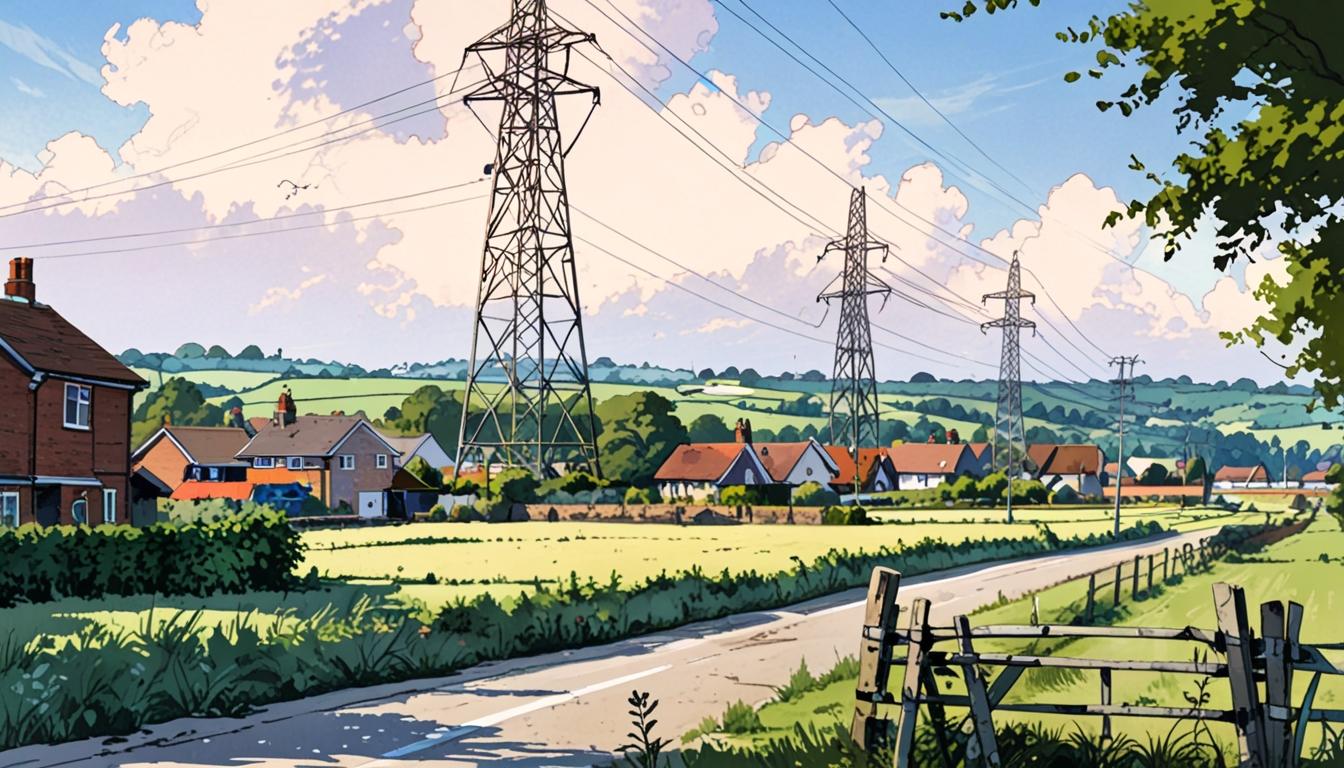The idyllic village of Ardleigh in Essex appears tranquil, yet beneath its picturesque surface lies a brewing storm. Local residents face the daunting prospect of 160ft electricity pylons and a 400ft-wide trench for cables, part of what has been termed the "Great Grid Upgrade." Spearheaded by Ed Miliband and the National Grid, this £16 billion initiative aims to modernise the UK’s electricity infrastructure, but has ignited fierce opposition among communities that fear losing both their homes and livelihoods.
The ambitious scheme, launched in April 2023, plans to stretch 625 miles of “pylon highways” from Grimsby in Lincolnshire to Walpole in Norfolk, with additional routes connecting Chesterfield to Willington in Derbyshire and East Yorkshire to Nottinghamshire. Politically, the push for this vast network coincides with a growing demand for renewable energy, expected to increase by 50% within the next five years and possibly double in 25. However, for Ardleigh, the oncoming pylons represent more than just an infrastructure upgrade; they threaten to alter the very fabric of community life.
Residents, facing potential loss of property values, are resolute in their opposition. Jayne and Bruce Marshall may lose up to 80% of their farmland, while Gilly and Paul Whittle’s £1.5 million home could be halved in value. Their fears stem not merely from financial losses but from the feel of their home being irrevocably transformed into an industrial landscape. As Gilly noted, “I’m not a Nimby or nay-sayer... We are rushing into these pylon plans for the sake of a political deadline.” This sentiment echoes among many, highlighting the clash between renewable ambitions and community integrity.
Across the region, the local outcry is reminiscent of the past protests surrounding HS2, the controversial high-speed rail project. Leading figures, including Sir Tony Blair, have publicly critiqued Miliband's eco-schemes, suggesting that the aggressive decarbonisation targets could be not just unrealistic, but detrimental. Labour-affiliated union leaders share similar concerns, asserting that a balance between environmental goals and community interests must be struck.
The National Grid posits that the pylons are essential to support a modernised energy system. However, critics argue that the potential environmental destruction and impact on property values undermine sustainable development. Studies have shown that homes near pylons can lose significant value, with property consultancy Allsop revealing a so-called “pylon penalty.” Research indicates that in Birmingham, homes near pylons sold for up to 23% less than the city average, while country properties suffer even greater declines.
Local entrepreneurs are also feeling the pressure. Robert Blyth and his sister own a vineyard affected by the proposed pylons, raising concerns about the project’s impacts on their crops and surrounding wildlife. Their thriving business, which has attracted a loyal customer base, faces an uncertain future. “National Grid don’t care about me and whether my business can survive this,” said Matt Wilsher, operator of the vineyard's café, underscoring sentiments that resonate across the local economic landscape.
The pushback against the pylons isn't just about aesthetic or property concerns—it's also an issue deeply tied to agricultural viability and food security. Jayne Marshall, involved in fruit cultivation, emphasised the importance of maintaining the community's agricultural roots, lamenting that the urgency behind the net-zero ambitions could jeopardise essential food production. Echoing this view, Dr Jonathan Dean from the Campaign for the Protection of Rural Wales pointed out that there are better methods for electricity transmission that remain unexplored. “What is a price worth paying?” he questioned, challenging the notion that the current trajectory is the only path forward.
Various stakeholders, including local councils from Essex, Norfolk, and Suffolk, have expressed their unified opposition. Their letter to the National Grid articulates concerns not only about the impact on landscapes but also highlights alternatives that have yet to be considered, such as offshore cabling solutions that could mitigate many issues raised by residents. As MP Bernard Jenkin has argued, these options deserve exploration, especially considering the significant cultural and ecological heritage at stake.
Despite the backlash, Miliband has dismissed these criticisms, labelling them as “old nonsense and lies” while referring to opponents as “obstructionists.” Yet this response may not dampen the rising tide of frustration from local communities watching their landscapes change irrevocably.
As Ardleigh braces for potential upheaval, many hope that enough voices raised in opposition will lead to genuine reconsideration of how Britain modernises its energy infrastructure. Ultimately, the question remains: can the government meet its ambitious green goals while preserving the very communities that form the backbone of rural Britain?
Reference Map
- Paragraph 1: [1]
- Paragraph 2: [1]
- Paragraph 3: [1]
- Paragraph 4: [1][2]
- Paragraph 5: [1][2]
- Paragraph 6: [1][4]
- Paragraph 7: [1][4]
- Paragraph 8: [1][4]
- Paragraph 9: [2][5]
- Paragraph 10: [3]
- Paragraph 11: [4][7]
- Paragraph 12: [5]
- Paragraph 13: [3][4][5]
- Paragraph 14: [6]
- Paragraph 15: [1]
Source: Noah Wire Services
